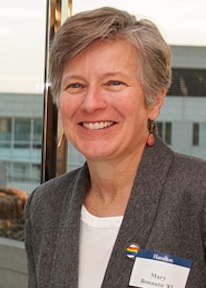By Karys Blakemore
“No gay person in this country would be married without Mary Bonauto.”
– Roberta Kaplan
The MacArthur Foundation is known worldwide for its dedication to progress, creativity, and equality. Since its creation on October 18, 1970, the foundation has worked tirelessly to promote these values through the completion of a multitude of philanthropic deeds, one of which is to annually select a small group of innovators and dreamers to become MacArthur Fellows. For their incredible contributions to society, these Fellows receive grants so that they might continue to explore, examine, and push boundaries.
But what makes a MacArthur Fellow? What characteristics are shared by this group of individuals that make them worthy of such a prestigious honor? To answer these questions, one need simply look to the work of Mary L. Bonauto, a 2014 recipient of this so-called genius grant.
People all over the United States have been positively affected by the litigious efforts of Bonauto, though many of them may be unaware of her role in the advocacy for and protection of their civil rights. Bonauto has been referred to as a quiet hero and stalwart advocate. She was also more recently compared to Thurgood Marshall. Why? Because she is passionately devoted to the eradication of one of the grossest injustices of our time: marriage inequality.
Bonauto has been the Civil Rights Project Director at Gay and Lesbian Advocates and Defenders (GLAD) since 1990. In this position, Bonauto uses her knowledge, passion, and experience as a civil rights lawyer to lead a team of litigators in the fight against discrimination. Bonauto explains her work for GLAD thusly: “What I do, as a lawyer at GLAD, is try to make sure that everyone has freedoms and opportunities regardless of their sexual orientation, their gender identity, their HIV status.”
Bonauto and her team at GLAD are responsible for the existence of a multitude of state laws that now protect civil unions and same-sex marriages. Bonauto’s first big win as a GLAD litigator in Baker v. Vermont (1999) led to the establishment of civil unions in the state of Vermont. This case was paramount because it not only gave homosexual partners in Vermont the same benefits and rights as heterosexual spouses, but also, “… led to the nation’s first civil union law.”
In 2003, Bonauto was a driving force behind the Massachusetts case Goodridge v. Department of Public Health, the first case in history in which a state’s high court would vote in favor of same-sex marriage. Bonauto also counseled in Kerrigan v. Department of Public Health (2008), thus winning Connecticut the right to same-sex marriages.
When asked about the effect of her work on the general public, Bonauto responded: “… we’ve … seen … enormous changes in attitude. Many people have changed their minds because they have realized, when same sex couples marry, what happens? You celebrate their commitment, their responsibility to one another. There’s more joy.”
Bonauto is living proof that intelligence and passion can be used to create social change. While these traits make her worthy of the highest praise, however, it is her selfless commitment to spreading joy that makes her truly deserving of the title of “MacArthur Fellow.”
Mary L. Bonauto majored in history and comparative literature and graduated Phi Beta Kappa from Hamilton College in 1983. (Photo by Larry Canner.)
Karys Blakemore is currently a senior at George Mason University majoring in Russian and Eurasian Studies and Spanish as a foreign language. She became a member of Phi Beta Kappa in her junior year. George Mason is home to the Omicron of Virginia Chapter of Phi Beta Kappa.




